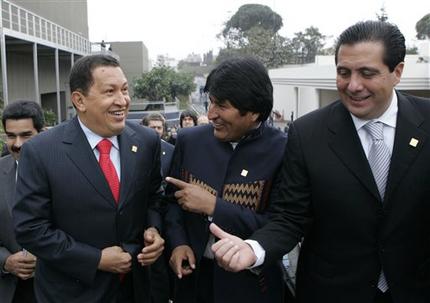
(above) Venezuela's President Hugo Chavez, left, Bolivia's President Evo Morales, center, and Panama's President Martin Torrijos talk as they leave the opening plenary session of the Fifth Latin America and European Summit is being held in Lima, Friday May, 16, 2008. European and Latin American leaders are gathering in Lima to tackle climate change, high food prices and poverty. (AP Photo/Natacha Pisarenko)
Latin America-Europe leaders make pledges
May 17, 2008 - ChicoER.com (AP)
By MONTE HAYES Associated Press Writer
LIMA, Peru (AP) -- European and Latin American leaders have pledged to fight poverty, global warming and high food prices, presenting a show of unity amid a festering conflict between two South American nations.
The regions' fifth summit in a decade concluded on Friday just a day after Interpol vouched for the authenticity of documents implicating Venezuela's Hugo Chavez in efforts to support Colombian rebels. Interpol's report prompted impassioned denials from Chavez.
Peruvian President Alan Garcia opened the summit with an appeal for nearly 60 leaders or top officials to put aside petty issues and focus on setting clear strategies to combat poverty and global warming.
"It is imperative that what unites us take precedence in our meetings," Garcia said. "We leave aside, for the moment, what we disagree on."
In the summit's final declaration, leaders vowed to fight poverty, drugs and crime and said they were "deeply concerned by the impact of increased food prices," which have spiraled as global demand for commodities soars.
"We agree that immediate measures are needed to assist the most vulnerable countries and populations affected by high food prices," the declaration said, stressing the need to support rural farming "to meet a growing demand."
Garcia suggested that every country aim to increase food production by 2 percent.
The declaration also encouraged free trade and cooperation on biofuels, although those goals were not as universally endorsed.
Bolivia and Ecuador in particular resisted plans for a trade association between the Andean Community and European Union, while Brazilian President Luiz Inacio Lula da Silva was forced to defend biofuels such as ethanol - of which his country is the world's largest exporter.
"Obviously, the oil industry is behind" criticism of alternative fuels, Silva told reporters in Lima, dismissing claims that corn- and sugarcane-based ethanol are partly responsible for soaring food prices.
But despite persisting policy differences, participants seemed to overcome sharper political feuds, such as that brewing between Venezuela and Colombia.
Interpol on Thursday confirmed the integrity of computer files, seized from a rebel camp, that suggest Venezuela has armed and financed Colombian guerrillas - discrediting Chavez's assertions that Colombia had faked them.
The findings boost pressure on Venezuela's anti-U.S. president to explain his ties to the Revolutionary Armed Forces of Colombia, or FARC, Latin America's most powerful rebel army.
Chavez on Thursday dismissed Interpol's report as "ridiculous." He denied arming or funding the guerrillas - though he openly sympathizes with them - and threatened Thursday to scale back economic ties with Colombia.
"One of the big problems we have (on the continent) is the government of Colombia," Chavez said in brief remarks during a break at the summit. "The show, the lies, the manipulation. The relations with paramilitary groups and drug trafficking. There are grave problems in Colombia."
He called Colombian President Alvaro Uribe "a promoter of disunion" - saying Uribe did "not fit in" in a region where the leaders of Venezuela, Argentina, Chile, Uruguay, Bolivia and Paraguay "are a brotherhood."
Uribe told a Lima radio station that he had no problems with Venezuela or Ecuador, and felt "the greatest affection, the greatest respect" for both.
"The only thing we ask is that no one give shelter to terrorists," he said, noting that his greatest problem is dealing with the FARC, a guerrilla movement that has existed for more than 40 years.
Colombia's March 1 attack on a FARC camp where the computer files were discovered prompted Ecuador's Rafael Correa, an ally of Chavez, to sever diplomatic relations with Colombia and to denounce the computer documents, which indicated that his government also had dealings with the FARC.
Ecuadorean Justice Minister Gusto Jalkh insisted Friday that the computer files "cannot have credibility" because they had been mishandled.
During a European tour this week, Correa said he would consider restoring ties only if Uribe halts "Colombia's verbal aggression."
The three feuding leaders met for the first time Friday since an uncomfortable summit in the Dominican Republic in March, when Uribe and Chavez embraced one another at the urging of Dominican President Leonel Fernandez, and Correa reluctantly shook Uribe's hand.
French Prime Minister Francois Fillon urged leaders to put their "personal interests aside" and continue efforts to free Ingrid Betancourt, a dual French-Colombian citizen and former Colombian presidential candidate kidnapped by the FARC in 2002.
Chavez and Correa have offered to negotiate the release of Betancourt and other hostages.
One personal feud that seemed to have cooled on Friday was between Chavez and German Chancellor Angela Merkel. Chavez gave his German counterpart a kiss, apparently ending a verbal spat that had erupted last week.
Merkel had drawn Chavez's wrath by saying he did not speak for Latin America, and that his leftist polices would not solve the region's problems. He responded by accusing her party of sharing the ideals of Adolf Hitler.
"I have not come here to fight. It was a great pleasure to shake her hand," Chavez said Friday. "I told her: 'If I said something very harsh, forgive me.'"